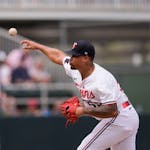 See
more of the story
See
more of the story
NEW YORK - Major League Baseball came up with an untraditional idea last winter: Skip the pitches thrown during an intentional walk, and save time by pointing the batter to first base.
Maybe, when the Twins face the Yankees in the postseason, MLB could adapt a similar strategy. Save on travel costs and wait-til-the-midnight-hour endings by nodding New York into the next round.
The Twins' latest loss in the Bronx did not follow the time-honored pattern of a late collapse. Ervin Santana saw to that in an 8-4 season-ending wild card loss at Yankee Stadium.
Santana spent Monday acting like a leader, an ace, a tranquil veteran. His team had lost 12 straight playoff games? He had been as cursed in Yankee Stadium as the Twins of recent history?
What, him worry? Santana coasted through the day with a smile on his face.
On Tuesday, Santana's superficial calm seemed fraudulent as an infomercial. Handed a 3-0 lead in the first inning while facing a flustered younger pitcher, Santana lasted just two innings, allowing four runs and giving the Yankees their first lead.
Santana couldn't muster the composure of his younger teammates. In one night in the Bronx, he called into question his postseason worthiness and future role.
"You can imagine what it would be like to be at 0-0 instead of scoring three and giving three back,'' Twins manager Paul Molitor said. "The deflating, of giving it back so quickly ... there was a lot. A lot spent early.''
Santana remains the Twins' best starting pitcher, but that, today, sounds more like an insult to the franchise than a compliment to him. If he can't handle the pressure of facing the Yankees or leading a young team in the playoffs, the Twins' desperate need for pitching quality and depth appears even more dire than when they appeared to be falling out of the playoff race during the middle of the season.
If Santana isn't going to pitch like an ace, who will? Perhaps Jose Berrios. He replaced Santana and allowed three runs in three innings, but he, unlike Santana, did not walk the first batter he faced, and he, unlike Santana, was making his first postseason appearance at the end of his longest professional season.
Santana walked the first batter, then allowed a single to Aaron Judge, and two batters later, a three-run homer to Didi Gregorius. Four batters into his first Twins postseason start, Santana had given away a three-run lead.
With one out in the second, Todd Frazier launched a Santana pitch deep to center. Byron Buxton slammed into the wall while making the catch. He later left the game because of a sore back.
The next batter, Gardner, created another kind of pain. He took a fastball under his chin, then took a vicious swing on Santana's next pitch, lining it into the stands in right field. Gardner dropped his bat, watched the ball fly, belatedly began jogging and stared at Santana from the first base line. Santana faced one more batter and left with a career ERA of 7.05 in new Yankee Stadium.
"It's disappointing, but you don't get excited in this stadium about three runs, because anything can happen,'' Santana said. ''The ball flies here.''
The minimum expectation for Santana should have been six strong innings, which would have given the Twins a lead and a chance to interrupt their 15-year Bronx slump.
The Twins' position players deserved better, and will require more if they're going to become annual contenders. If Santana can pitch them to the postseason but not thrive there, how valuable will he be?
Win or lose this game, the Twins were going to need arms. Santana will be 35 next season, Kyle Gibson, Hector Santiago and Adalberto Mejia remain mysteries and the bullpen lacks a closer.
Tuesday, Santana belied the carefree attitude he had feigned and sent the Twins into another winter searching for pitching, at the top of the rotation and throughout the organization.
Jim Souhan's podcast can be heard at MNSPN.com. On Twitter: @SouhanStrib. • jsouhan@startribune.com






